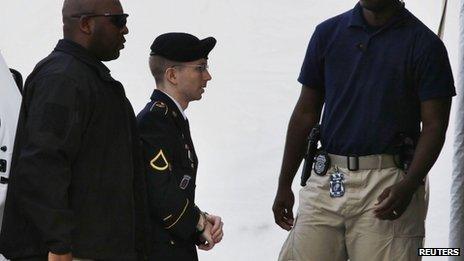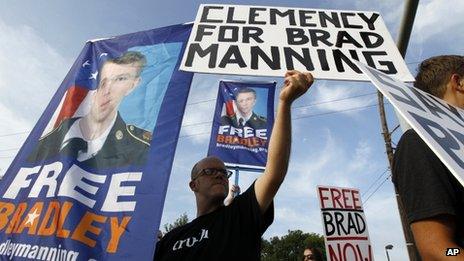Bradley Manning's 35-year sentence is a halfway house
- Published

Pte Manning says he leaked the files to spark a debate about US foreign policy
It will be little consolation to the slight, young soldier whose face didn't flicker as sentence was passed, but the judge went for a halfway house - 35 years in prison. Not the 60 years demanded by the prosecution, nearer the 25 asked for by the defence.
Although Pte First Class Bradley Manning's supporters are angry at his treatment - and the US military seemed determined to make an example of him - the case hasn't excited great public passion.
But President Barack Obama has a dilemma- how to portray and treat a new breed of spillers of secrets.
These are not traitors motivated by money or an ideological sympathy with the enemy, but leakers driven by a conviction that information should be free, that secrecy itself is evil.

Supporters of Pte Manning have announced an online petition asking President Barack Obama to pardon him
Although Pte Manning's leaking was profligate, and Edward Snowden far more focused on alleged wrongdoing, the back story is the same - a cultural clash.
What happens when men imbued with the almost romantic concept of a high-tech world where information flows freely work in a world where secrecy is an assumed virtue?
But this case also raises another glaring question - how could such a junior soldier get his hands on so much secret information, with apparently such ease?
The answer is in part the backwash after the destruction of the Twin Towers. One of the lessons learnt was the danger of high, artificial walls between the USA's many intelligence and security agencies - they simply couldn't join the dots because they didn't know the whole picture.
But lowering those walls has meant the whole world now has that information as well.
President Obama doesn't want to appear the heavy-handed enemy of free information, but the glare of light on what has been kept in the dark has alarmed the administration.